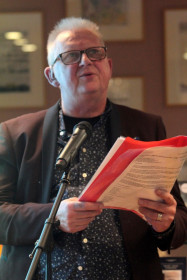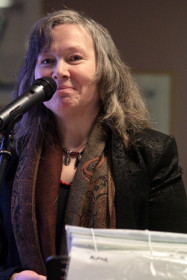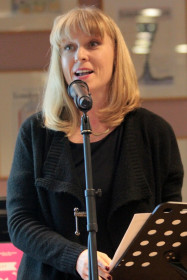Deaf and hearing poets unite at launch of ground-breaking magazine issue

“This is the first time that I’m seeing both deaf and hearing, signed and spoken poetry in one space, and that for me is a dream come true.” Raymond Antrobus, who was born deaf, was speaking at the launch of Magma magazine’s The Deaf Issue on Friday at the London Review Bookshop.
Each issue of Magma, which is published three times a year, has a particular theme, and a different editor. At the reading there were poets, in the words of the magazine’s editorial, “whose first language is expressed through the body” via British Sign Language, poets who wear hearing aids, and poets writing about the onset of hearing loss. Hearing poets were accompanied by BSL interpreters as they read, plus a screen that relayed their words. And the audience was urged to wave, as well as to clap.
Raymond Antrobus co-edited the issue with Lisa Kelly, who is deaf in one ear after contracting mumps as a child. In their magazine editorial they say: “We hope this inspires all poets with disabilities to feel they can submit to literary magazines (beyond ‘one-off special’ editions), to see their work alongside hearing and able bodied writers, too.”
BSL poet Ksenia Balabina, pictured above, a freelance BSL tutor, signed ‘A Parallel Between Two’, which was originally a BSL film-poem, about a bird learning to sing and to fly, and a young child learning to sign. Deaf poet Donna Williams signed her poem ‘Finally, a Dream come True’, a tribute to Cass, the strong, deaf character played by deaf actress Sophie Stone in Doctor Who: “He’s met the barely living,/ he’s met the really dead. / But after aeons of travelling/ He’s finally met the deaf!”


Her poem ‘Alphabetula’ is presented visually in Magma as a single block of capitalised text, and at the reading she used a slip chart that showed a series – quite a long series, in fact, - of segments of the text. Before presenting it she explained: “I have divided the line into visual units, which lead to sound units … it’s a poem that celebrates my experience, as a deaf person, of language as a malleable object, to be played with. Language is a magical thing.”
Sophie Woolley, pictured below, had contributed an article to Magma about the strange case of the fake interpreter at the memorial service for Nelson Mandela in 2013. At the time she had just regained her hearing via cochlear implant. In her article she says: “The anomalous atrocity of the jerky, wooden, repetitive gesticulating of Thamsanqa Jantjie, the imposter sign language interpreter, at Soweto stadium, as he stood next to a eulogising President, made me feel, not angry, but ashamed, duped and disappointed.

There were seven other poets who took part in this rich, rewarding reading. Marilyn Longstaff began to go deaf in her mid-40s, and took early retirement because her job involved a lot of listening. She explained how “as I got deafer, and older”, deafness crept into her poetry, “bit by bit”. Her poem ‘The Archaeology of Isolation’ describes the process, from failed ear operations, improved hearing aids, to amplified phone and flashing doorbell, and concludes: “ ‘could you just say that again?’ ;/ trying throughout to remain cheerful; / being a bore. And you ask me, ‘Why don’t you get out more?’ “
Jill Abram introduced her poem ‘Noisemaker’ with some sign language that she learned “a long time ago”, and which was, she said, “a little rusty”. Her day job involves conjuring up sound effects at the BBC. Peter Surkov is a young medical student, and his sequence ‘Five False Starts on Deafness’ is based on his father’s loss of hearing, “his untrained eyes / straining for words from presenters’ lips”.

The title of Keith Jarrett’s poem is beyond my reproduction. I am far too likely to introduce a typo. You will just have to buy a copy of Magma. He explained that it came from a Facebook post, and involved “typing in tongues”. Hannah Lowe opened the reading with a moving poem about her mother, ‘The Stroke’.
One running joke at the reading was the difficulty of getting published in Magma, for any poet. In their editorial Lisa Kelly and Raymond Antrobus pay tribute to anthologies such as Beauty is a Verb; The New Poetry of Disability (Cinco Puntos Press) and the recent Stairs and Whispers: D/deaf and Disabled Poets Write Back (Nine Arches Press) and online journal Deaf Poets Society, and add: “We hope this issue continues to challenge what poetry is considered in magazines, like Magma, or any literary magazines in the future.” Poetry gatekeepers, please take note.
You can buy copies of Magma The Deaf Issue here




